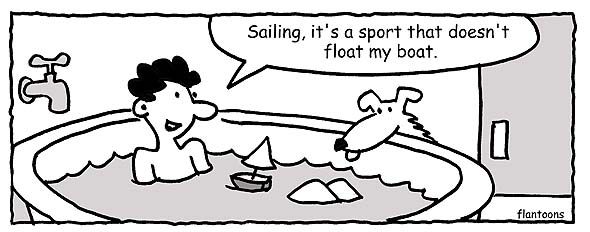
Rules:
Do you know where to put the adjective in a sentence? Follow these simple rules to help you remember:
1. The adjective comes before the noun.
e.g. I live in a small house.
I have a blue umbrella.
2. The adjective comes after the verb to be.
e.g. I am very tired.
Careful, the food is hot!

If something does not float your boat, you do not enjoy it or want it. When something floats your boat, you like it.
Example Sentences:
"The idea of playing football on a cold winter morning doesn't float my boat."
"Reading books doesn't really float my boat."
Sometimes you may find yourself hearing words in the street that you haven't seen in your English text books before.
Confusingly, you may only hear these words in one country! In fact, slang can be specific to a country, a town or even a specific group of people.
Below are some of the most common slang words or expressions that you may hear in an English speaking country.
Just put the word/words into the sentence you think they might belong to.
Can you remember how to ask these questions? In each question there is one missing word. For example:
"___is your favourite teacher?"
The missing word is who.
Only use one word for each question and use the present simple.
If you have time, tell us your answers to these questions!
Lesson by Caroline Devane
Students - in each sentence do you know who is talking, the waiter or the customer?
For example: 'Would you like fries with that?' is something that the waiter would ask.
When you have answered the questions, tell us what your favourite restaurant is, and your favourite food!
Good luck! PS: Two of the sentences have different words but the same meaning- we say one in American English and one in British English. Which two sentences have the same meaning?
Lesson by Caroline
How much do you remember about the 'wh' question words? This lesson shows a conversation between a police officer and a suspect of a crime. The police officer is asking the suspect a lot of questions to try and get information that will help them to solve the crime.
Read through the text and try to complete the gaps with the missing 'wh' word.
The words you will need are: what, who, when, why, which, how, where
Do you think the suspect is innocent or guilty?
We all get sick from time to time, so it is a good idea to learn some idioms that you may hear on a visit to the doctors or in general conversation; or you may find the idioms useful to use yourself.
Below are some medical idioms along with some example sentences of their use. Can you match them to their meanings? When you are finished, see if you can write some sentences which include the idioms and share them with us.
Lesson by Caroline
A similie is an expression we use when comparing two things using the words 'like' or 'as'.
Here are some common examples:
Have you ever given a presentation or made a speech to a group of people? Did you feel nervous? Did the people enjoy what you said?
Take a look at this paragraph and pay special attention to the 5 idioms in orange:
Summer's officially here in Europe and rest of the northern hemisphere. In Malta the weather's amazing and there are already plenty of tourists around soaking up the sun and relaxing on the beaches.
When you arrive in a new place it's always a good idea to ask the locals for advice on the best things to see and do. Maltese people are exceptionally friendly and more than happy to give visitors advice. If you ever come here, don't be shy to ask for a recommendation!